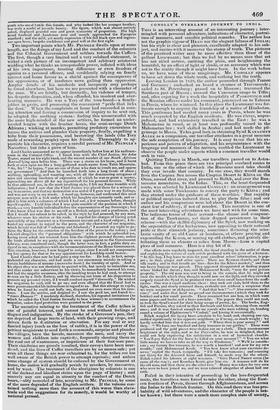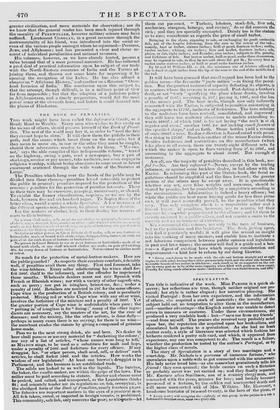CONOLLY'S OVERLAND JOURNEY TO INDIA.
THIS is an interesting account of an interesting journey ; inter- mingled with personal adventure, indications of character, portrai- ture of manners, and sensible political remarks. The author has not the graphic vigour of HEAD nor the elegant fulness of INGLis; but his style is clear and pleasant, excellently adapted to his sub- ject, and carries with it moreover the stamp of truth. The pictures of the practised writer may be more effective than those of the gallant Lieutenant ; but then we feel by no means sure that art has not aided nature, omitting the plain, and heightening the beautiful, by an effect of light or shade, or an accessory which was not in the reality though it might have been. In the work before us, we have none of these misgivings. Mr. CONOLLY appears to have set down the whole truth, and nothing but the truth.
Leaving London in 1S29, the author proceeded through France and Germany ; embarked on board a steamer at Travemunde ; sailed to St. Petersburg; passed on to Moscow; traversed the Southern part of Russia ; crossed the Caucasian range to Tiflis; and, after enjoying for a week the hospitality of PASKOVITCH and the Russian officers under his command, journeyed on to Tabreez in Persia, where he wintered. In this place the Lieutenant was for- tunate enough to acquire the friendship of a native of IIindostan. This gentleman had resided many years in Persia, where he was much respected by the English residents. lie was clever, unpre- judiced, and had extensively travelled in the East : he was. a Mahometan in creed, or at least was profoundly versed in the Mahometan law ; well skilled in Arabic ; and had made the pil- grimage to Mecca. To his good luck in obtaining Syud KARAUSIUT ALLEE as a companion, our traveller attributes in a great measure the safe completion of his journey. It is easy to see that his ex- perience and powers of adaptation, and his acquaintance with the language and manners of the natives, enabled the Lieutenant to observe the people under aspects which a common traveller would seek in vain.
Quitting Tabreez in March, our travellers passed on to Astra- bad. From this place there are two principal overland routes to India, one or the other of which the Russians must take should they ever invade that country. In one case, they would march from the Caspian Sea across the Caspian Desert to Khiva on the Oxus, ascend that river, and proceed to Bulkh, and over the Bau- meeaun mountains, to the Indus. This, as the least-frequented route, was selected by Lieutenant CONOLLY: an arrangement was made with some Toorkmuns to convey the party to Khiva ; and they started under the guidance of these worthies. But cupidity or political suspicion induced them to play them false; and our author and his companions were led about the Desert in the con- stant fear of robbery, if not of murder. This narrative is one of the most interesting adventures we have met with for some time. The ludicrous terror of their servant—the shame and compunc- tion of the Toorkmuns, yet their dogged persistence in their scheme—with the skilful diplomacy of the Synd, now working on the superstition of the barbarians, now appealing to their national pride or their clannish jealousy, sometimes flattering the scho- lastic vanity of an old Cazce or headman, at others praying and expounding the Koran, or tearing up old clothes, and gravely dis- tributing them as charms or relics from Mecca—form a capital piece of real romance. here is a tiny bit of it.
Our effects were regularly inspected, the Syud standing in the midst of them and explaining the nature of each article produced with the grace of a lecturer. "In this bag, I beg leave to state for your excellent selves' information, is pep- per ; in that, ginger and other spice. These are Kerman shawls, and those silk scarfs ; and in that bundle are furs—furs for the Khiva market ;" and thus our heavy baggage was passed. They appeared disappointed at finding pepper where looked for ducats ; but, said Moliummud Knoli, "now for your private property." The old man was sent to bring in the camels, that lie might not view the wealth which they thought would now see the light, and they crowded eargerly round the Sy ud as he produced two or three small boxes from the muff- rushes. One was a small medicine chest : they took out vials, held them to the light, smelt, and slowly returned them, evidently not without a suspicion that we were conjurors or alehymists. "And that box ?"—" Also contains medi- cine ;" and under that head we passed our thermometers (which they took for bottles) and a few small parcels. There remained but one box, in which were some papers and books alid a brass astrolabe. The papers they could not read, so took the Syud's word for their being scraps of poetry, Rix. The books, Eng- lish and Persian, they raised to their foreheads and kissed, deeming them sacred ones; and it was farcical enough to see rascals who were rubbing us, handing round a volume of Elphinstone's " Canbul," and kissing it reverentially. Thibek weighed the heavy brass astrolabe in his baud, and, shutting one eye, nodded significantly to his opposite neighbour, as if to say, so much weight : we hardly satisfied him that it was not gold. " Where then is your money ?" said they. " We have one hundred and linty tomauns in our girdles." These were produced and the gold pieces were shaken out on a cloth. Their countenanees brightened at the sight, and as for Peerwullee, he was so delighted, that he could not help expressing his satisEiction in a sort of hysterical chuckle. " You'll pay Babek for the horse he killed on your account"' " You see what little money we have to take us all the way to flindostan." " We'll he conside- rate; say twenty five tomauns, he was worth a hundred ! and now for my own trouble," said Mohammad Kouli. " You best know what your exertions de-
serve," replied the Syml, resignedly. take five tomauns ; and counting out thirty for the deceased horse and himself, he made way for the others. Babek valued his labours at eight tomauns. "Give Daoud Nuzzer seven (he came all the way); and Kourbau Kuuli, give him six. A tomaun will do for the old man, and then there are the other two." Money was taken for two men who were to have joined us, and we were relieved altogether of about half our cash.
Foiled in their intention of proceeding by the less-frequented route, the travellers were forced to take the other, along the East- ern frontiers of Persia, thence through Affghaunistaun, and across the Indus to the British frontier. On this road there was less pro. Lability of wild adventures, and the character of the people is bet- ter known; but there were a much more complex state of society,
.greater civilization, and more materials for observation; nor do we know that the general reader has been much injured through the rascality of PEERWULLEE, however military science may have suffered. Lieutenant CONOLLY, in a great measure through the instrumentality of his friend, was introduced into the social ar- cane of the various people amongst whom he sojourned—Persians, Jews, and Affighauns ; and has presented a clear and clever ac- count of individual peculiarities and national manners.
His volumes, however, as we have already hinted, possess a value beyond that of a mere personal narrative. He has collected a good deal of practical information upon he subject of our trade with the North-Eastern countries of India and the Tartars ad- joining them, and thrown out some hints for improving it by opening the navigation of the Llus. He has also affixed a chewer on " Alfghaun History," and another on a Russian " Over- land Invasion of India." His conclusion upon this subject that the attempt, though difficult, is in a military point of view far from impossible ; but that the adoption of a judicious policy in Affehanistaun, and a timely preparation, would foil the most potent army at the eleventh hour, and before it could descend into the plains of Hindustan.





















 Previous page
Previous page